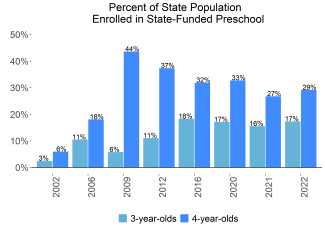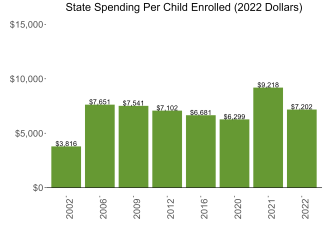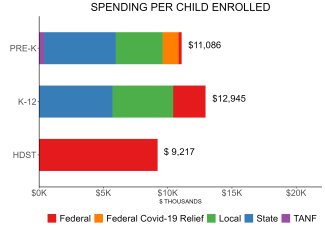
State of Preschool
Arkansas
Access Rankings
Resource Rankings
Total Benchmarks Met
Overview

During the 2021-2022 school year, Arkansas preschool enrolled 19,097 children, an increase of 1,772 from the prior year, as the program began to recover from the impact of the COVID-19 pandemic. State spending totaled $106,500,000 and an additional $7,500,000 in TANF funds and $23,535,701 in federal recovery funds supported the program, down $22,161,173 (14%), adjusted for inflation since last year. State spending per child (including TANF and federal recovery funds) equaled $7,202 in 2021-2022, down $2,016 from 2020-2021, adjusted for inflation. Arkansas met 8 of 10 quality standards benchmarks.
What's New

For the second year in a row, in response to the COVID-19 pandemic, Arkansas paid each Arkansas Better Chance (ABC) grantee the full awarded grant amount during the 2021-22 school year, to maintain their business, pay staff, and provide services for children and families. Arkansas is also in the second year of the Pre-K R.I.S.E. Early Childhood Literacy Initiative with a sharpened focus on early literacy by providing professional development grounded in the Science of Reading to strengthen instruction in foundational literacy as well as provide high quality instructional materials to align research and practice. The LearnERS: Continuous Quality Improvement (CQI) Coaching Framework is being piloted to combine collaborative relationships to support CQI by providing job embedded professional development to early childhood educators across the state based on individual CQI growth plans. The T.E.A.C.H. Early Childhood Arkansas Scholarship and the Step Up to WAGE$ wage supplement programs have been developed in Arkansas to increase the level of education for early childhood educators while making the educational process affordable, increasing wages, and reducing turnover.
In December 2022, Arkansas was awarded a federal Preschool Development Grant Birth through Five (PDG B–5) three-year renewal grant for $12 million. The state plans to use the funding to provide additional support for enhancement of infant and toddler care, family engagement and trauma informed care for children ages three to five.
Background
The Arkansas Better Chance (ABC) program began in 1991 as part of a statewide education reform initiative, with funding ($10 million) earmarked to serve children birth to 5 years old based on family income, developmental, and/or economic risk factors. In 2003, legislation known as Arkansas Better Chance for School Success (ABCSS) set priorities for funding, supporting 3- and 4-year-olds in households with incomes up to 200% of the federal poverty level. School districts with 75% or more of their students scoring below proficient in literacy and math on the State Assessment, and children in schools designated as “school improvement status” receive prioritized funding.
ABC/ABCSS components intended to ensure quality include: one teacher with at least a bachelor’s degree per every three classrooms at a site and teachers with an associate degree in the other two classrooms; teacher assistants/paraprofessionals with a minimum of a CDA or equivalent; low child-to-teacher ratios (1:10); health and development screenings; parent involvement and community engagement; statewide child assessment (Work Sampling); an approved list of curriculum aligned with the 2016 Arkansas Child Development and Early Learning Standards; and classroom quality observations to inform technical assistance; and an evaluation of child outcomes through a longitudinal study.
Arkansas Better Chance/Arkansas Better Chance for School Success
Access
Resources
| Total state pre-K spending | $137,535,701 |
| Local match required? | Yes |
| State Head Start spending | $0 |
| State spending per child enrolled | $7,202 |
| All reported spending per child enrolled* | $11,086 |

Pre-K programs may receive additional funds from federal or local sources that are not included in this figure. K–12 expenditures include capital spending as well as current operating expenditures. Head Start per-child spending includes funding only for 3- and 4-year-olds.
Arkansas Quality Standards Checklist
| Policy | Requirement | Benchmark | Meets Benchmark? |
|---|---|---|---|
For more information about the benchmarks, see the Executive Summary and the Roadmap to State pages. | 8benchmarks met | ||
| Early Learning & Development Standards Benchmark | Comprehensive, aligned, supported, culturally sensitive | Comprehensive, aligned, supported, culturally sensitive | |
| Curriculum Supports Benchmark | Approval process & supports | Approval process & supports | |
| Teacher Degree Benchmark | One BA per 3 classrooms; AA for other 2 classrooms | BA | |
| Teacher Specialized Training Benchmark | ECE, CD, ECE SpEd | Specializing in pre-K | |
| Assistant Teacher Degree Benchmark | CDA | CDA or equivalent | |
| Staff Professional Development Benchmark | 30 hours/year; PD plans; Coaching for novice teachers | For teachers & assistants: At least 15 hours/year; individual PD plans; coaching | |
| Maximum Class Size Benchmark | 20 (3- & 4-year-olds) | 20 or lower | |
| Staff to Child Ratio Benchmark | 1:10 (3- & 4-year-olds) | 1:10 or better | |
| Screening & Referral Benchmark | Vision, hearing, health & more | Vision, hearing & health screenings; & referral | |
| Continuous Quality Improvement System Benchmark | Structured classroom observations; Data used for program improvement | Structured classroom observations; data used for program improvement | |

